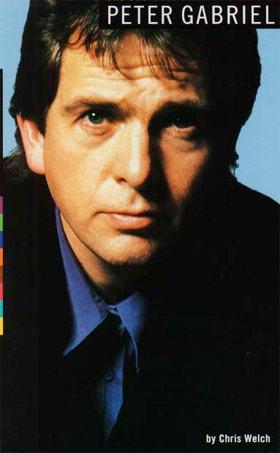- Article
- Read in 3 minutes
Peter Gabriel – Chris Welch: The Secret Life Of Peter Gabriel – book review
Chris Welch is considered THE Genesis journalist. His reports about Genesis were not always neutral but full of enthusiasm, and so he has done his bit to help the former heroes of progressive rock to stardom. Now he has written a book about Peter Gabriel.
Peter Gabriel’s new album Up is at least two years overdue. Is there anything to entertain fans while they are waiting? Well, there is a new biography. Is it entertaining?
The Secret Life Of Peter Gabriel by Chris Welch is the latest publication about a (former) member of Genesis. Ray Coleman has set very high standards with his Collins biography. Chris Welch does not live up to them. Readers will approach this book with mixed feelings. They are curious, of course, and want to read something new about the most innovative musician from the Genesis camp. But it is also very unlikely that Gabriel has revealed any real surprises. Plus, the book is by Chris Welch,who is a bit prone to exaggerations and overly euphoric statements about Genesis. One can hardly expect a book from him that is as neutral and clear-sighted as Ray Coleman’s.
 And it is like that. Welch attempts to analyze Gabriel again and again from the same point of view, and he often fails because of the simple fact that Gabriel’s complex character cannot by analyzed. He also likes to reminisce: “When I was sitting with Gabriel in the rehearsal room”, stressing the “I”. Indeed there is an atmosphere of “The Gabriel and I” that permeates the whole book. What is really annoying is the large number of mistakes all over the place. Tony Banks’ birthday is postponed for a year, the value of (certainly valuable) single The Knife is grossly overestimated (Welch mentions 500 pounds, i.e. 750 EUR instead of the real market price of 150-200 EUR) or typos that turn The Light Dies Down On Broadway into The Light Lies Down On Broadway. The list goes on. Chris Welch is, despite his occasionally excessive praise for Genesis, an expert. An expert’s publication ought to be free from these embarrassments. Another thing is that Welch does not hide his own opinion, giving sometimes quite rough statements about songs (for one thing, he calls the hidden gem Home Sweet Home “less satisfactory”). But these are the exceptions.
And it is like that. Welch attempts to analyze Gabriel again and again from the same point of view, and he often fails because of the simple fact that Gabriel’s complex character cannot by analyzed. He also likes to reminisce: “When I was sitting with Gabriel in the rehearsal room”, stressing the “I”. Indeed there is an atmosphere of “The Gabriel and I” that permeates the whole book. What is really annoying is the large number of mistakes all over the place. Tony Banks’ birthday is postponed for a year, the value of (certainly valuable) single The Knife is grossly overestimated (Welch mentions 500 pounds, i.e. 750 EUR instead of the real market price of 150-200 EUR) or typos that turn The Light Dies Down On Broadway into The Light Lies Down On Broadway. The list goes on. Chris Welch is, despite his occasionally excessive praise for Genesis, an expert. An expert’s publication ought to be free from these embarrassments. Another thing is that Welch does not hide his own opinion, giving sometimes quite rough statements about songs (for one thing, he calls the hidden gem Home Sweet Home “less satisfactory”). But these are the exceptions.
Apart from that there is hardly any criticism. The book becomes actually really interesting when Welch delves into the private life of Peter Gabriel and tries to sort of the confusing aspects of the Gabriel family. He is actually quite good at that, and every now and then he brings up an interesting piece of information. Peter’s former partner Rosanna Arquette’s favourite singer, for example, is not Peter Gabriel but Phil Collins. She is actually the Rosanna Toto sing about in their world-wide hit. Another interesting story deals with the first time Peter actually had a space cookie – around the time he recorded PG III (!). He actually had several of them and felt so bad that he went home to tell his family he was going to die soon. When he arrived his wife Jill thought he had had an accident. According to Peter, his daughter felt that everything was okay and that Peter was not any different than usual. Unfortunately there are few direct statements from the people involved and so it all turns into Chris Welch’s meditation on the unfathomable character of Peter Gabriel.
While Welch tells the interesting story that leads from PG I to So one gets the impression that this is not only a Gabriel biography, but also Chris Welch’s story of self-discovery. His narrations and explanations about that period are interesting, to be sure, but he does not manage to stay neutral. While he praises Gabriel and wallows in self-discovery he forgets to tell the story from So to Us. Not a word about that period. Chris Welch’s details about Up are dated by now, but that is not his fault, of course.
The book is well-structured chronologically, with few exceptions that are due to Gabriel’s private life. It leaves the reader with mixed impressions of Welch’s life and the incomplete picture of a rock legend. The book is less fun to read than Coleman’s Collins biography. Welch turns the biography into a report of the philosophical foundations of a fan and his idol. He loses his professionalism on the way. But that is probably the charm this little book has nevertheless.
by Christian Gerhardts
translated by Martin Klinkhardt
